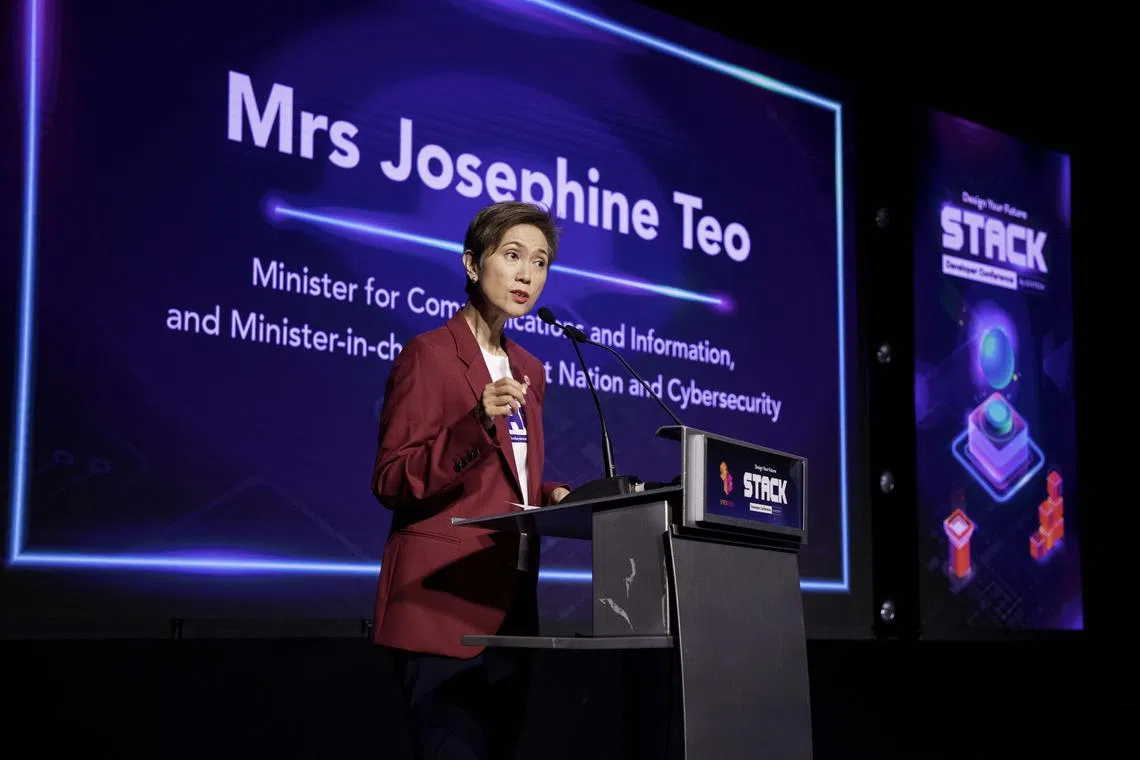99% of government transactions with citizens can now be done digitally: Josephine Teo
Sign up now: Get ST's newsletters delivered to your inbox

Minister for Communications and Information Josephine Teo delivering her opening address at the Stack 2022 Developer Conference on Nov 15, 2022.
PHOTO: GOVTECH
SINGAPORE - Almost all transactions between citizens and national agencies can now be done digitally, surpassing the Government’s goal of offering digital services for up to 95 per cent of transactions by 2023.
These include services added to the Government’s slate of digital services within the past two years, such as use of the digital IC, RedeemSG, a platform for issuing vouchers, and the revamped Singapore Courts website.
At the Stack 2022 Developer Conference at the Suntec Singapore Convention and Exhibition Centre on Tuesday, Minister for Communications and Information Josephine Teo said: “In 2018, we set out to make most of our government services available online.
“Today, 99 per cent of all transactions between citizens and Government can be completed digitally from end to end, any time and anywhere.”
This is ahead of the Government’s initial target of up to 95 per cent of transactions with citizens by 2023,
Mrs Teo cited the development of RedeemSG,
She said: “One reason for the digital vouchers’ widespread adoption was design. Even in electronic form, the CDC (Community Development Council) vouchers came in denominations of $2, $5 and $10, like the banknotes we are used to.
“This was not a coincidence but a deliberate design feature to retain a sense of familiarity as people were encouraged to go digital.”
She said the smaller denominations made it more useful to hawkers and shopkeepers in the heartland. More than 19,000 merchants have onboarded with RedeemSG, Mrs Teo added.
When asked which services had been digitalised recently, the Government Technology Agency (GovTech), which organised Stack, cited the Singapore Courts website, which was launched in November 2021.
The site consolidated information across the Supreme Court, the State Courts and the Family Justice Courts. Users could access administrative documents and other resources to prepare for court matters.
GovTech also pointed to the roll-out of digital ICs on the Singpass app
But some services are unable to be digitalised for legislative reasons, or due to technology being inaccessible to some segments of the population, such as seniors and the disabled, according to the Digital Government Blueprint.
It is not known which specific services have yet to be digitalised as The Smart Nation and Digital Government Office did not respond by press time.
Seniors have been the target of national digital literacy initiatives such as Seniors Go Digital, which supports the elderly in adopting digital channels.
In Parliament in 2020, then Nominated MP Anthea Ong urged the authorities to do more to help “digital outcasts”,
Letters to the The Straits Times Forum have also highlighted this struggle.
Retiree Chan Mei Mei wrote in December 2021 that she was increasingly marginalised by e-payment systems
Another forum contributor, Mr Paul Chan, said it was hard for seniors to navigate telco websites


